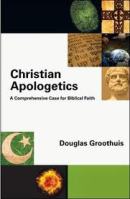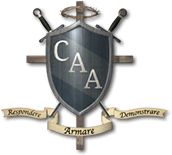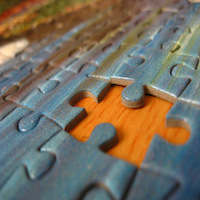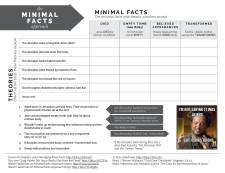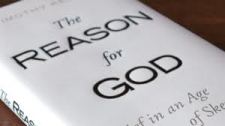This chapter of Groothuis’ Christian Apologetics covers the truth claims of Islam and its objections to Christianity.
My Background in Islam (skip this to discuss the chapter)
I’ve noticed an odd fascination with Islam in the U.S. post-9-11, a sort of national Stockholm syndrome…the way some women are attracted to bad boys. My awareness of Islam first began just before the new millennium. My husband was stationed in Ft. Bragg, North Carolina, and we bought a computer with tax return money shortly after he got home from a deployment to Panama. All my unanswered questions from high school poured through my fingertips as I tapped them out on whatever search engine was popular back then. Among other things, I found a lot of Islamic material against Christianity–Paul, in particular. I didn’t know any better. I thought I was duped my whole life to believe a lie. I didn’t convert to Islam, but I did become an atheist for a while. The Islamist material didn’t make a case for Islam, but even so, converting to Islam (instead of atheism, for me) would’ve been like switching from belief in Santa, to belief in the Tooth Fairy.
I have read a *bit* on the history of Islam, but nothing chapter-length that laid its beliefs out systematically. Most of my curiosity had to do with why Israel is so hated, how much progress has been made towards peace there, how far back the conflict goes, where it started, who is preventing peace from being attained, and so on. Vaguely I remember studying it (& the Crusades, et cetera) in public school in various history classes.
When 9-11 happened, we had just moved to Arizona. My mother-in-law woke me up with a phone call and asked me if I had the TV on, and told me to turn it on when I said I hadn’t yet…I saw the footage of the planes flying into the Twin Towers, heard that it was terrorism and cried for my country. Like everyone else, I was glued to it as events played out (Pentagon, et cetera), watching for survivors. If I didn’t have two young boys, I would have joined the military. The unit my husband left behind in NC were deployed to Afghanistan. The unit in Arizona started 12 hour shifts. Discrimination against a Muslim in the unit was nipped in the bud. At some point, my dad knew bin Laden was hiding in Pakistan. The anthrax letters happened shortly after that, and I wondered how bad things would get.
Post-9-11, I’ve been exposed to material arguing for why terrorism-spawning Islam is not “extremist” but Quran-based (and how that compares to “genocide” in the Old Testament). I have watched part/all of a debate between a Christian and a Muslim that weighed the truth claims of each against the other. I’ve read a bit on who Islam thinks Jesus is and how it perceives his crucifixion/resurrection, who it thinks inherited the promises (Isaac or Ishmael), and stuff like that. I’ve read stuff warning against the spread of Shari’ah Law, and U.S. women actually *wanting* to wear those hijabs (prolly same sort of women who write letters to serial killers in jail). (Sorry…that’s culturally insensitive of me, isn’t it?) (Honestly, sometimes, when my complexion is particularly bad, I would welcome a hijab.)
A woman in a hijab scared the crap out of me in a Books-A-Million when we lived in North Carolina. Not something you expected to run in to as you turned a corner back then. Years later, I worked with a Muslim. She was a very nice girl, and she translated all the religious terms into American terms, like “church” and “pastor.” I think she didn’t want to trigger any unwarranted fear. She fasted during Ramadan, but didn’t expect everyone else to, like you see in the news these days. She didn’t wear a hijab…she sort of went the opposite direction in the clothing department, which sort of confused me. But she was genuinely nice, and well-liked. But the show 24 featured an American woman who had converted to Islam and become a terrorist. It’s just TV, but it speaks to a genuine fear, because the news actually talks about people who grow up in the U.S. and train as terrorists overseas after they convert. The terrorists on 9-11 had lived here for a while. Consider the bombings in Boston. Sometimes I wonder why the U.S. is not more war-torn. Alternatively on TV, there is Arastoo Vaziri, a ‘squintern’ in one of my favorite shows, Bones. There’s also the kalam cosmological argument. That’s my background in Islam. Pretty ignorant. What’s yours?

